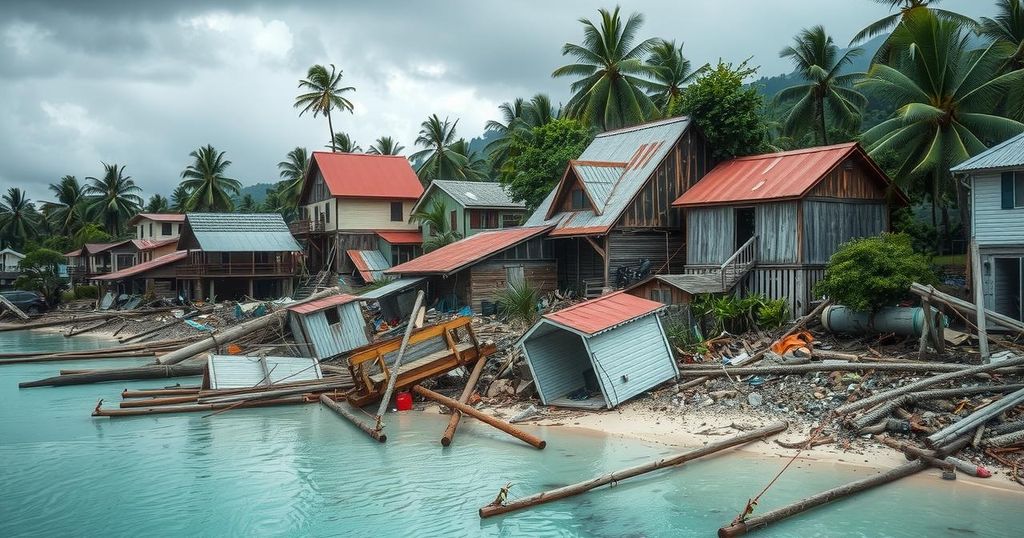Devastation from Cyclone Chido and Vanuatu Earthquake Forces Urgent Response
Tropical Cyclone Chido caused extensive devastation in Mayotte, Comoros, and Mozambique, while a powerful earthquake struck Vanuatu shortly thereafter. Direct Relief is responding to the healthcare needs arising from these disasters, which threaten public health through potential disease outbreaks and disrupted medical services. Their ongoing commitments include delivering medical supplies and evaluating urgent needs in affected regions.
Recent natural disasters have wreaked havoc across regions in Africa and the Pacific, exacerbating existing vulnerabilities among affected communities. Tropical Cyclone Chido devastated the Mayotte archipelago, Comoros, and Mozambique, described as the most potent storm to impact Mayotte in nearly a century. Wind speeds soared above 140 miles per hour, leading to a rising death toll. Concurrently, a 7.3-magnitude earthquake struck Vanuatu, prompting concerns about additional hardships in a region already grappling with crisis.
Cyclone Chido inflicted severe damage across Mayotte, resulting in a current official death toll of 22, but estimates suggest this may rise into the thousands following assessments. Entire neighborhoods were wiped away, particularly affecting unsafe settlements. Comoros also suffered extensive destruction, leading its president to declare a week of mourning. In Mozambique, the cyclone’s impact was equally severe, damaging infrastructure and healthcare facilities and adding to the region’s vulnerability.
Direct Relief is actively engaged in addressing the healthcare needs of those affected. In collaboration with French emergency services in Mayotte, they aim to provide immediate healthcare support. In Comoros, they are partnering with Santé Diabète for support assessments, while outreach to Mozambique’s Ministry of Health is ongoing to supply emergency medical resources. Furthermore, in Vanuatu, the earthquake has necessitated coordination with healthcare organizations to ascertain urgent needs, with relief supplies on the way.
Natural disasters like these significantly threaten public health due to immediate injuries, deaths, and the overwhelm of local healthcare systems. Overflowing shelters lead to increased risks of infectious diseases, and disruptions hinder the treatment of chronic health issues. Expectant mothers and infants are particularly vulnerable during these crises. Direct Relief’s commitment includes delivering critical medical supplies, ensuring health services are maintained amidst the chaos.
Direct Relief has a robust history of responding to disasters by providing essential medical aid. Their efforts following Cyclone Idai, for instance, included over 100 tons of support to impacted regions in Africa. They have similarly provided emergency assistance after significant earthquakes in Türkiye and Syria and have engaged in long-term recovery for countries like Haiti and Nepal. Direct Relief also pre-positions medical supplies in advance of likely disaster seasons.
The article discusses two catastrophic natural disasters: Tropical Cyclone Chido, which affected Mayotte, Comoros, and Mozambique, and a subsequent earthquake in Vanuatu. These events highlight the vulnerability of communities in regions prone to severe weather and seismic activity, stressing the importance of disaster response organizations like Direct Relief. The ongoing challenges for these affected populations span immediate medical needs, infrastructural damage, and long-term health threats exacerbated by the disasters.
The recent disasters in Mayotte, Comoros, Mozambique, and Vanuatu underscore the urgent need for humanitarian assistance and highlights the resilience of communities facing these crises. Direct Relief plays a critical role in addressing healthcare needs and ensuring timely delivery of medical aid. As these disasters unfold, continued support is pivotal to help these communities recover and build back stronger, capable of withstanding future crises.
Original Source: www.directrelief.org




Post Comment